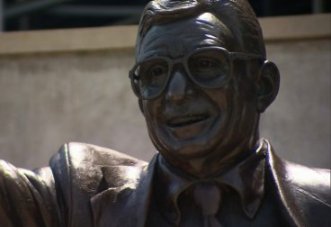 Pennsylvania Gov. Tom Corbett announced plans Wednesday to file an anti-trust lawsuit against the NCAA over its sanctions against Penn State University following the Jerry Sandusky child sex abuse scandal.
Pennsylvania Gov. Tom Corbett announced plans Wednesday to file an anti-trust lawsuit against the NCAA over its sanctions against Penn State University following the Jerry Sandusky child sex abuse scandal.
Last July, the NCAA levied unprecedented sanctions against the university, including a fine of $60 million. It also stripped 14 seasons of football victories from late head coach Joe Paterno.
"These sanctions did not punish Sandusky," or those who allegedly helped cover up his repeated sexual abuse of disadvantaged children, said Corbett at a news conference in State College.
He said they instead affect past and current students who were not part of the scandal.
"I cannot and will not let it happen without a fight," said Corbett, adding that the Sandusky case was a criminal matter and not a violation of NCAA rules.
Corbett also called a university-funded review of the scandal led by former FBI Director Louis Freeh an incomplete report.
Freeh's 267-page review was released in July and blamed former university president Graham Spanier, Paterno, suspended Athletic Director Tim Curley and ex-Vice President Gary Schultz for allegedly taking part in a cover-up to avoid bad publicity.
The scandal led to Spanier's ouster and shocked the nation after Freeh's team concluded that the school's top administrators had "empowered" Sandusky, the former defensive coordinator for the football team, to continue his abuse.
The fine is expected to be paid over five years and will fund an endowment with a mission of fighting child sex abuse and supporting victims.
Pennsylvania's U.S. House delegation objects to the NCAA's plans to spend only 25% of those funds within the state.
The delegation wants the association to spend all of the $60 million in Pennsylvania, according to a November letter to the NCAA.
"While we fully support the stated purpose of the endowment, we believe its funds should be used solely for programs and organizations within the Commonwealth of Pennsylvania, where a need exists for the creation of prevention programs for sexually abused children," the letter stated.
The NCAA declined to comment Tuesday on the governor's planned lawsuit, spokesman Bob Williams said. The organization historically doesn't comment on any possible legal actions unless and until they are filed, he said.
Sandusky, 68, was convicted last June on 45 counts of child sex abuse, ranging from corruption of minors to involuntary deviate sexual intercourse, which were laid out in graphic testimony by his accusers over the course of the less-than-two-week trial. In October, he was sentenced to 30 to 60 years in prison, meaning he'll likely die behind bars.
Penn State, a college football powerhouse and two-time national champion, avoided the NCAA's "death penalty," a suspension from play of a year or more, in the Sandusky abuse case.
But Ed Ray, the chairman of the NCAA's executive committee, said the sanctions on the school "should serve as a stark wake-up call to everyone in college sports."
Penn State President Rodney Erickson said the university accepted the decision and would not appeal. "I think, for the whole university, what this calls upon us to do is to look at our whole value culture, our whole value set, our value base," Erickson told CNN last year.
Paterno, who coached at Penn State for 46 years, was fired after Sandusky's arrest in November 2011. He had been the all-time leader in major college football victories for a coach, with 409 wins. The NCAA's decision strikes 111 of those from his record, beginning in 1998 -- a move that posthumously bumps him from the top of the list.
Last July, the Big Ten Conference declared Penn State ineligible for any conference title football games and ruled that the Nittany Lions' share of bowl revenues for four seasons -- about $13 million -- will be donated to charities that "protect children."
David La Torre, a Penn State spokesman, said last year the school will not use tax or tuition dollars to pay the NCAA's $60 million fine.
Portland and Seattle
Free Subscription to Breaking News
Free Subscription to Breaking News




















































































































































































































































































































































